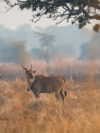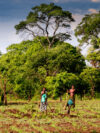
At Nsanga Conservation Zambia, our mission is to effectively and sustainably contribute to conserving extensive natural landscapes in Zambia by combining research and community engagement.
By combining scientific studies with meaningful partnerships within local communities, we create lasting and impactful conservation solutions.
Research for Conservation
Our research efforts serve as the cornerstone of our conservation work. By gathering and analyzing valuable data on ecological processes, biodiversity, and social dynamics, we provide critical insights that inform conservation strategies and decision-making. Through rigorous scientific inquiry, we aim to equip conservation practitioners and stakeholders with the knowledge needed to protect and restore Zambia’s natural ecosystems.
Together, research and community engagement form the bedrock of our approach, enabling us to create meaningful and lasting conservation impact across Zambia’s landscapes.
Community Engagement for Ownership
We believe that true conservation success hinges on the active involvement and support of local communities. Our community engagement initiatives are designed to foster a sense of ownership and acceptance of conservation efforts among local residents.
Through education, livelihood and living standard improvements, capacity building, and participatory approaches, we empower communities to become stewards of their natural heritage. Nsanga solely provides the necessary resources to communities to promote community stewardship of the local environment.
By fostering strong partnerships and dialogue, we ensure that conservation interventions are culturally sensitive, socially inclusive, and sustainable in the long term.
Currently, our conservation efforts primarily target the Central Luangwa Valley System, encompassing Luambe National Park, Lukusuzi National Park, and the surrounding Game Management Areas, with a particular emphasis on Lumimba Game Management Area.
This area spans several Chiefdoms, including Chitungulu, Mwanya, and Nabwalya Chiefdoms.
Our Work Principles
Scientific Integrity
By conducting ethical and professional science we ensure that our conservation efforts are based on accurate and reliable data, leading to more effective decision-making. It upholds transparency and accountability, fostering trust among stakeholders and the broader community. Maintaining scientific integrity also allows us to adapt and improve our methods, ensuring that our initiatives are both credible and impactful.
Local Leadership
Local leadership empowers communities to take ownership of conservation efforts, ensuring long-term sustainability. It integrates traditional knowledge and practices, making initiatives more culturally relevant and effective. Additionally, it fosters trust and collaboration, essential for the successful implementation of conservation projects.Evidence Based
Evidence-based actions ensure that our conservation strategies are guided by proven research, maximizing their effectiveness and impact. They reduce the risk of unintended consequences by relying on data-driven insights rather than assumptions. By grounding our efforts in evidence, we can continually refine our approaches, leading to more sustainable and successful outcomes.
Empowerment
Interdisciplinary Teamwork
Interdisciplinary teamwork brings together diverse expertise, allowing for more comprehensive and innovative solutions to conservation challenges. It encourages collaboration with individuals, organizations and institutions across different fields, leading to a more holistic understanding of complex environmental issues. By integrating various perspectives, interdisciplinary teamwork enhances our ability to address conservation problems from multiple angles, ultimately improving the effectiveness of our efforts.











